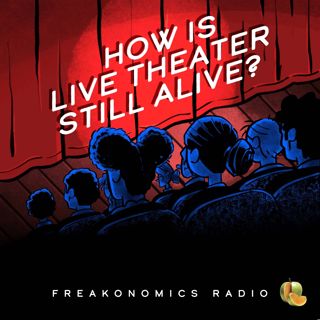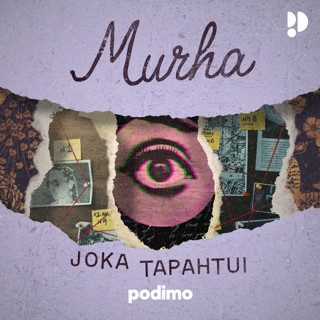
608. Cannabis Is Booming, So Why Isn’t Anyone Getting Rich?
There are a lot of reasons, including heavy regulations, high taxes, and competition from illegal weed shops. Most operators are losing money and waiting for Washington to get out of the way. In the meantime, it’s not that easy being green. (Part two of a four-part series.) SOURCES:Jon Caulkins, professor of operations research and public policy at Carnegie Mellon University.Adam Goers, senior vice president of The Cannabist Company and chairperson of the Coalition for Cannabis Scheduling Reform.Precious Osagie-Erese, founder and C.E.O. of Precious Canna Co.Nikesh Patel, C.E.O. of Mammoth Distribution.Nikesh Patel, director of the San Francisco Office of Cannabis.Tom Standage, deputy editor of The Economist. RESOURCES:"Most Americans Favor Legalizing Marijuana for Medical, Recreational Use," (Pew Research Center, 2024)."Whitney Economics U.S. Legal Cannabis Forecast - 2024 - 2035," by Beau Whitney (Whitney Economics, 2024)."Beer Sellers Use a Loophole to Break Into Weed Drinks Market," by Redd Brown (Bloomberg, 2024)."Cannabis Producer Seeks Boston Beer Merger," by Lauren Thomas (The Wall Street Journal, 2024)."California's 'Apple Store of Weed' Declares Bankruptcy With $410M in Debt," by Lester Black (SFGate, 2024)."Is the State Democratic Chair Influencing Who Can Sell Legal Weed in this N.J. City?" by Jelani Gibson (NJ.com, 2023)."When Prohibition Works: Comparing Fireworks and Cannabis Regulations, Markets, and Harms," by Jonathan P. Caulkins and Kristina Vaia Reimer (International Journal of Drug Policy, 2023)."Did Minnesota Accidentally Legalize Weed?" by Paul Demko (Politico, 2022). EXTRAS:"Is America Switching From Booze to Weed?" by Freakonomics Radio (2024)."The Economics of Sports Gambling," by Freakonomics Radio (2019).
24 Loka 202450min

607. Is America Switching From Booze to Weed?
We have always been a nation of drinkers — but now there are more daily users of cannabis than alcohol. Considering alcohol’s harms, maybe that’s a good thing. But some people worry that the legalization of cannabis has outpaced the research. (Part one of a four-part series.) SOURCES:Jon Caulkins, professor of operations research and public policy at Carnegie Mellon University.Yasmin Hurd, director of the Addiction Institute at Mount Sinai.Michael Siegel, professor of public health and community medicine at Tufts University.Tom Standage, deputy editor of The Economist.Ryan Stoa, associate professor of law at Louisiana State University. RESOURCES:"Cannabis Tops Alcohol as Americans’ Daily Drug of Choice," by Christina Caron (The New York Times, 2024)."Deaths from Excessive Alcohol Use — United States, 2016–2021," by Marissa B. Esser, Adam Sherk, Yong Liu, and Timothy S. Naimi (Morbidity and Mortality Weekly Report, 2024)."Nixon Started the War on Drugs. Privately, He Said Pot Was ‘Not Particularly Dangerous,'" by Ernesto Londoño (The New York Times, 2024)."A Brief Global History of the War on Cannabis," by Ryan Stoa (The MIT Press Reader, 2020).Craft Weed: Family Farming and the Future of the Marijuana Industry, by Ryan Stoa (2018)."How the Sugar Industry Shifted Blame to Fat," by Anahad O’Connor (The New York Times, 2016)."The Perils of Ignoring History: Big Tobacco Played Dirty and Millions Died. How Similar Is Big Food?" by Kelly D. Brownell and Kenneth E. Warner (The Milbank Quarterly, 2009).A History Of The World In Six Glasses, by Tom Standage (2005)."Cancer and Coronary Artery Disease Among Seventh-Day Adventists," by E. L. Wynder, F. R. Lemon, and I. J. Bross (Cancer, 1959). EXTRAS:"Why Is the Opioid Epidemic Still Raging?" series by Freakonomics Radio (2024)."Daron Acemoglu on Economics, Politics, and Power," by People I (Mostly) Admire (2024)."Let’s Be Blunt: Marijuana Is a Boon for Older Workers," by Freakonomics Radio (2021)."What’s More Dangerous: Marijuana or Alcohol?" by Freakonomics Radio (2014).
17 Loka 202446min

606. How to Predict the Presidency
Are betting markets more accurate than polls? What kind of chaos would a second Trump term bring? And is U.S. democracy really in danger, or just “sputtering on”? (Part two of a two-part series.) SOURCES:Eric Posner, professor of law at the University of Chicago Law School.Koleman Strumpf, professor of economics at Wake Forest University. RESOURCES:"A Trump Dictatorship Won’t Happen," by Eric Posner (Project Syndicate, 2023).The Demagogue's Playbook: The Battle for American Democracy from the Founders to Trump, by Eric Posner (2020)."The Long History of Political Betting Markets: An International Perspective," by Paul W. Rhode and Koleman Strumpf (The Oxford Handbook of the Economics of Gambling, 2013)."Manipulating Political Stock Markets: A Field Experiment and a Century of Observational Data," by Paul W. Rhode and Koleman S. Strumpf (Working Paper, 2007)."Historical Presidential Betting Markets," by Paul W. Rhode and Koleman S. Strumpf (Journal of Economic Perspectives, 2004). EXTRAS:"Has the U.S. Presidency Become a Dictatorship? (Update)," by Freakonomics Radio (2024).“Does the President Matter as Much as You Think?” by Freakonomics Radio (2020)."How Much Does the President Really Matter?" by Freakonomics Radio (2010).
11 Loka 202455min

Has the U.S. Presidency Become a Dictatorship? (Update)
Sure, we all pay lip service to the Madisonian system of checks and balances. But presidents have been steadily expanding the reach of the job. With an election around the corner, we updated our 2016 conversation with the legal scholar Eric Posner — who has some good news and some not-so-good news about the power of the presidency. (Part one of a two-part series.) SOURCE:Eric Posner, professor of law at the University of Chicago Law School. RESOURCES:"Presidential Leadership and the Separation of Powers," by Eric Posner (Daedalus, 2016).The Executive Unbound: After the Madisonian Republic, by Eric Posner and Adrian Vermeule (2010). EXTRA:"Does the President Matter as Much as You Think?" by Freakonomics Radio (2020).
10 Loka 202446min

605. What Do People Do All Day?
Sixty percent of the jobs that Americans do today didn’t exist in 1940. What happens as our labor becomes more technical and less physical? And what kinds of jobs will exist in the future? SOURCES:David Autor, professor of economics at the Massachusetts Institute of Technology.Paula Barmaimon, manager of coverage and audience analytics at The New York Times.Ellen Griesedieck, artist and president of the American Mural Project.Adina Lichtman, co-host of the Our Friends Are Smart party.Avi Popack, co-host of the Our Friends Are Smart party.Huck Scarry, author and illustrator.James Suzman, anthropologist and author.Ben Varon, rabbi and chaplain at NYU Langone Hospital—Brooklyn . RESOURCES:"New Frontiers: The Origins and Content of New Work, 1940–2018," by David Autor, Caroline Chin, Anna Salomons, and Bryan Seegmiller (The Quarterly Journal of Economics, 2024).Work: A Deep History, from the Stone Age to the Age of Robots, by James Suzman (2020).Working: People Talk About What They Do All Day and How They Feel About What They Do, by Studs Terkel (1974).What Do People Do All Day?, by Richard Scarry (1968)."Economic Possibilities for our Grandchildren," by John Maynard Keynes (1930).American Mural Project. EXTRAS:"Will the Democrats 'Make America Great Again'?" by Freakonomics Radio (2023)."How to Stop Worrying and Love the Robot Apocalypse," by Freakonomics Radio (2021)."Did China Eat America’s Jobs?" by Freakonomics Radio (2017).People I (Mostly) Admire.
3 Loka 20241h

EXTRA: Roland Fryer Refuses to Lie to Black America (Update)
His research on police brutality and school incentives won him acclaim, but also enemies. He was suspended for two years by Harvard, during which time he took a hard look at corporate diversity programs. As a follow-up to our recent series on the Rooney Rule, we revisit our 2022 conversation with the controversial economist. SOURCE:Roland Fryer, professor of economics at Harvard University. RESOURCES:"How to Make Up the Covid Learning Loss," by Roland Fryer (Wall Street Journal, 2022)."Roland Fryer on Better Alternatives to Defunding the Police," by Roland Fryer (The Economist, 2020)."Harvard Suspends Roland Fryer, Star Economist, After Sexual Harassment Claims," by Ben Casselman and Jim Tankersley (The New York Times, 2019)."Why Diversity Programs Fail: And What Works Better," by Frank Dobbin and Alexandra Kalev (Harvard Business Review, 2016)."An Empirical Analysis of Racial Differences in Police Use of Force," by Roland G. Fryer, Jr (NBER Working Paper, 2016)."Getting Beneath the Veil of Effective Schools: Evidence from New York City," by Will Dobbie and Roland G. Fryer (American Economics Journal, 2013)."Financial Incentives and Student Achievement: Evidence From Randomized Trials," by Roland G. Fryer (The Quarterly Journal of Economics, 2011)."Toward a Unified Theory of Black America," by Stephen J. Dubner (The New York Times, 2005).Equal Opportunity Ventures.Intus Care.Reconstruction.Sigma Squared. EXTRAS:"Did the N.F.L. Solve Diversity Hiring?" series by Freakonomics Radio (2024)."The True Story of the Gender Pay Gap," by Freakonomics Radio (2016)."Does “Early Education” Come Way Too Late?" by Freakonomics Radio (2015).
30 Syys 20241h

604. Did the N.F.L. Solve Diversity Hiring? (Part 2)
What happened when the Rooney Rule made its way from pro football to corporate America? Some progress, some backsliding, and a lot of controversy. (Second in a two-part series.) SOURCES:Tynesia Boyea-Robinson, president and C.E.O. of CapEQ.N. Jeremi Duru, professor of law at American University.Herm Edwards, former N.F.L. player and head coach.Christopher Rider, professor of entrepreneurial studies at the University of Michigan.Jim Rooney, author and co-partner of Rooney Consulting.Scott Shephard, general counsel at the National Center for Public Policy Research. RESOURCES:The Social Impact Advantage: Win Customers and Talent By Harnessing Your Business For Good, by Tynesia Boyea-Robinson (2022).A Different Way to Win: Dan Rooney’s Story from the Super Bowl to the Rooney Rule, by Jim Rooney (2019)."If There’s Only One Woman in Your Candidate Pool, There’s Statistically No Chance She’ll Be Hired," by Stefanie K. Johnson, David R. Hekman and Elsa T. Chan (Harvard Business Review, 2016)."Racial Disparity in Leadership: Performance-Reward Bias in Promotions of National Football League Coaches," by Christopher I. Rider, James Wade, Anand Swaminathan, and Andreas Schwab (SSRN, 2016).Advancing the Ball: Race, Reformation, and the Quest for Equal Coaching Opportunity in the NFL, by N. Jeremi Duru (2010). EXTRAS:"Did the N.F.L. Solve Diversity Hiring? (Part 1)," by Freakonomics Radio (2024).“When Is a Superstar Just Another Employee?” by Freakonomics Radio (2023).“How Much Does Discrimination Hurt the Economy? (Replay),” by Freakonomics Radio (2023).
26 Syys 202447min

603. Did the N.F.L. Solve Diversity Hiring? (Part 1)
The biggest sports league in history had a problem: While most of its players were Black, almost none of its head coaches were. So the N.F.L. launched a hiring policy called the Rooney Rule. In the first episode of a two-part series, we look at how the rule succeeded — until it failed. SOURCES:N. Jeremi Duru, professor of law at American University.Herm Edwards, former N.F.L. player and head coach.Jim Rooney, author and co-partner of Rooney Consulting. RESOURCES:A Different Way to Win: Dan Rooney's Story from the Super Bowl to the Rooney Rule, by Jim Rooney (2019)."For ASU's Herm Edwards, Sports Bubble Helped to Overcome Racism Growing Up," by Jeff Metcalfe (The Arizona Republic, 2018).Advancing the Ball: Race, Reformation, and the Quest for Equal Coaching Opportunity in the NFL, by N. Jeremi Duru (2010)."Differences in the Success of NFL Coaches by Race, 1990-2002: Evidence of Last Hire, First Fire," by Janice Madden (Journal of Sports Economics, 2004). EXTRAS:"When Is a Superstar Just Another Employee?" by Freakonomics Radio (2023)."How Much Does Discrimination Hurt the Economy? (Replay)," by Freakonomics Radio (2023).
19 Syys 202447min






















